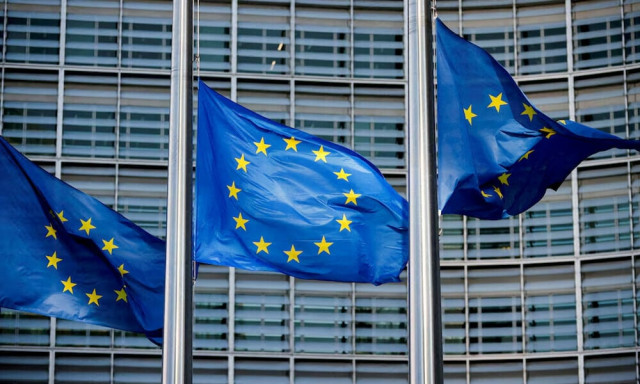Investors eye US-Europe deal before deadline
Optimism over easing trade tensions helps push US stocks to record highs

Investors are hopeful a potential trade deal between the US and European Union could bring more certainty to markets ahead of next Friday's tariffs deadline.
European Commission President Ursula von der Leyen was set to meet US President Donald Trump on Sunday in Scotland after EU officials and diplomats said they expected to reach a framework deal this weekend. Trump on Friday said there was a 50-50 chance or perhaps less that the US would reach a trade agreement with the EU.
Trade tensions between the US and Europe may have provided some investors with a rationale to be cautious, said Sameer Samana, Head of Global Equities and Real Assets at Wells Fargo Investment Institute. "It's one of our largest trading relationships... So if that last piece falls into place, then you've probably got at the margin more people that have to get back in the markets," Samana said. "It's been a source of uncertainty that will go away."
A deal would likely include a 15% baseline tariff on all EU goods entering the US and probably a 50% tariff on European steel and aluminum, the officials and diplomats said. Optimism over easing trade tensions broadly has helped push US stocks to record highs. Trump's April 2 "Liberation Day" announcement of sweeping global tariffs sent stocks plunging in the immediate aftermath, due to spiking fears about a recession that have since faded.
Still, investors have been bracing for increased volatility heading into August 1, which the US has set as a deadline for raising levies on a broad swath of trading partners.
The EU is facing US tariffs on more than 70% of its exports – 50% on steel and aluminum, 25% on cars and car parts and a 10% levy on most other EU goods, which Trump has said he would hike to 30% on August 1. Hopes for a deal with Europe rose after Trump struck a trade agreement with Japan earlier in the week.
"The deal with Japan and the likely one soon with the EU are especially important given both are major US trading partners, together accounting for about a quarter of all goods' imports," analysts at Capital Economics said in a note on Friday.
In the agreement with Japan, the country's auto sector, which accounts for more than a quarter of its US exports, will see existing tariffs cut to 15% from levies totaling 27.5% previously.
An agreement that also lowers EU auto tariffs to 15% "would be no small deal" for the region as well, as about 10% of its shipments to the US are in the same category, Capital Economics said.
Investors over the weekend were also watching for developments on trade between the US and China. Officials from the two countries plan to meet in Stockholm next week to discuss extending an August 12 deadline for negotiating a deal.
Seoul seeks mutually agreeable package
Meanwhile, South Korea will prepare a trade package that is mutually agreeable with the US ahead of minister-level meetings planned for next week and a US tariff-pause deadline of August 1, the presidential office said on Saturday.
The package will include shipbuilding cooperation, a sector of high interest to US Commerce Secretary Howard Lutnick, who discussed the matter with South Korea Industry Minister Kim Jung-kwan on Friday, it said in a statement.
Friday's meeting was a follow-up to a meeting on Thursday, where Lutnick and Kim reaffirmed their commitment to reach a trade deal by August 1, after a joint meeting of finance ministers and top trade envoys that had been scheduled for Friday was postponed.
South Korea, facing 25% tariffs, is rushing to reach a trade deal with Washington, with National Security Adviser Wi Sung-lac visiting the US recently for high-level talks and Minister for Trade Yeo Han-koo also in the US for negotiations, as pressure grows on officials to clinch a deal that is no worse than Japan's that cut tariffs to 15%.
South Korea's trade negotiations with the US have included non-tariff barriers in the agricultural and digital service sectors, but foreign exchange has not been part of trade talks beyond usual consultations, according to South Korean officials.
South Korea Finance Minister Koo Yun-cheol and Foreign Minister Cho Hyun will also hold meetings with US Treasury Secretary Scott Bessent and State Secretary Marco Rubio, respectively, next week.




















COMMENTS
Comments are moderated and generally will be posted if they are on-topic and not abusive.
For more information, please see our Comments FAQ